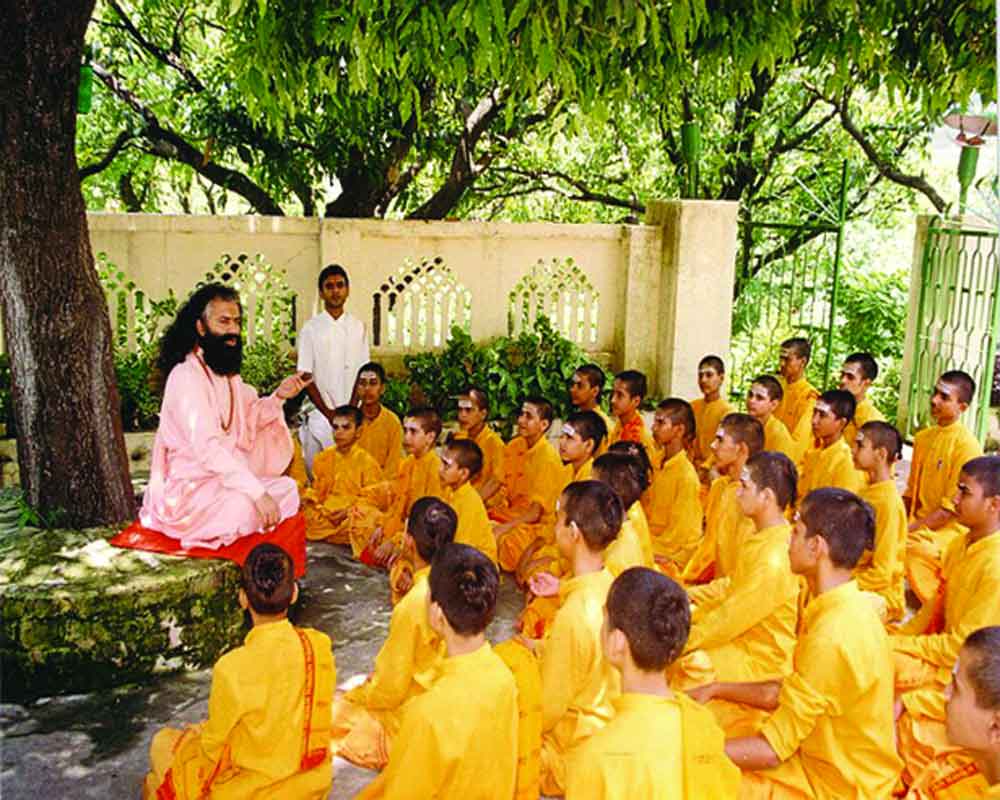Traditional systems, like the Gurukul method, stand juxtaposed against modern approaches, typified by the English education system
Everyone tries to prepare for the future. Most futures are difficult to foresee and preparing for them can only be based on some assumptions. The veracity of such assumptions is always open to doubt. Hence, preparing for the future, by definition, becomes one of the most conjectural efforts, several of whose assumptions need to be first checked out.
Yet, this cannot become an argument for not preparing for the future. It requires, therefore, foreseeing the future as a factor of continuing the present state of affairs in their logical linear sequence. It is another matter that the linearity of any process, be it technological, or even contextual, may be in doubt. Yet, this approach stands in its own right.
Thus, it is that school curriculum is preparation for the future because it teaches you the basics of reading, writing and arithmetic, all of which will, in some manner, help you cope with the future. As one grows, maybe through the curriculum system of schools, college or university, there are assumptions and there are logical flows. The logic of these sequential learning processes can be open to serious questions, and sometimes it becomes counterproductive by being out of sync with the requirements of the times.
That is a risk one has to take. Preparing for the future, therefore, can have its own hazards. Within the framework of the hazards, some assumptions could hold some truth. One of the assumptions is the need and the ability for strategic thinking. One also needs the skills to cope with an evolving environment and meet the requirement to achieve what one may set as one’s goals be they financial or professional.
One thing which cuts across all variations is the need to be a constantly evolving and growing person. Data and information are one of the coping stones of this learning process. Hence, it follows that one of the basic skills a person requires is identification of data and understanding of what constitutes information. This may require some rethinking on the elements and the parameters of formal education at the school level. One is fortunate if one is mentored properly during this phase, and this is where the Gurukul system, which India practiced till not so long ago, had at its core the mentorship of a wise, knowledgeable, and learned person who could impart only information but insights. The difference between what is now popularly termed as “English education” and the Gurukul system has become so wide that it is difficult to find distinguished learning institutions in sufficient numbers of the Gurukul tradition.
In an era of job markets and benchmarking of skills, the certification process which the so-called English education system follows comes in very handy. Hence, its relevance remains in the job market, and many jobs are open only to certain qualifications such as secondary certificate, bachelor certificates or the master certificate of the so-called university system. The parallel Indian system also has certain benchmarks such as a person could be a Kavya Teerth. This means that the person with the title of Kavya Teerth had proficiency in poetry and poetics. This would entitle him to be ranked as a person who has achieved excellence of a proficiency equivalent to a Teerth. The concern is that the job market does not often advertise for a person with the proficiency of a Teerth qualification in poetry and poetics.
Thus, the issue arises of calibrating the job qualifications requirements to a degree or the proficiency certificates being awarded by educational institutions. Unless this issue is addressed with a single-minded devotion of finding solutions, the present contradictions between the English system of education and the Gurukul system of education will continue to be loaded in favour of the University or the English system of education.
By all estimates, the Gurukul system of education was never loaded in favour of numbers, and as such, institutionalization of the Gurukul system seldom,if ever took place on the scale at which the English or the university system operated.
Further, the Gurukul system of education seldom had the kind of timetable which the English or the university system thrives on. Be it at the school level or the higher education level, in the English/University system of education a six-day week always had variations of subjects and inputs.
As compared to this, a Grurukul system of education may expect six months of intensive training, learning, and more in one subject, say geography, mathematics or whatever. It is easy to talk of “Indianness” and easier to sloganise it. The need, however, is to develop intensive educational insights which enable a person to understand which philosophy of education and which method of learning produces better preparation for the future.
To sum it all up, preparing for the future, in part, involves knowing methods of creating competencies for the unknown. It also requires creating some applicable assumptions. Whether the English or the university system of education can do it better, or can the Gurukul system do better, is a consideration which requires a lot more thinking and analysis than what it has merited so far. Mercifully, the National Education Policy has already planted the seeds by talking of “Indian educational system”. The seed has to sprout, be nurtured and allowed to grow before the fruits start coming in.
(The writer is a well-known management consultant of international repute. The views expressed are personal)


























